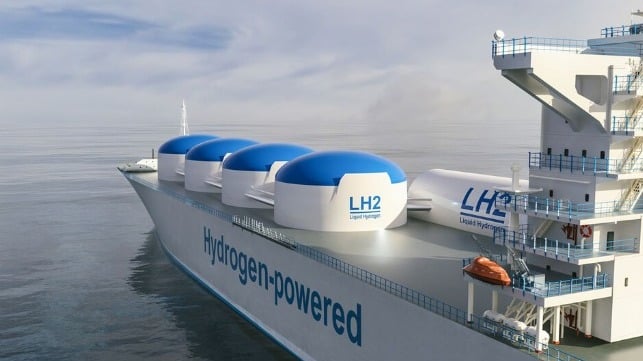Exploration of Liquid Hydrogen Shipping from Portugal to Netherlands

Efforts continue to focus on the development of the hydrogen supply chain to support the development of alternative fuels for heavy industry. In the latest development, a group of leading European companies, including Shell New Energies, ENGIE, and Vopak along with shipping company Anthony Veder have agreed to work together to study the feasibility of producing, liquifying, and transporting green hydrogen from Portugal to the Netherlands, where it would then be stored and distributed for sale. Their goal is to complete the first shipment of hydrogen by 2027.
“The consortium envisions hydrogen being produced by electrolysis from renewable power in the industrial zone of the Sines port,” the partnership said in announcing their new project. “Then the hydrogen is liquified and shipped via a liquid hydrogen carrier to the port of Rotterdam for distribution and sale.”
Shell and ENGIE will collaborate across the full value chain while Anthony Veder and Vopak will focus on shipping, storage, and distribution of the hydrogen. They will initially assess the potential of producing, transporting, and storing around 100 tons per day, with the potential to scale this up over time.
The project is the latest in a series of efforts designed to build the supply for hydrogen and ramp up the scale of the supply chain to meet the potentially broad industrial uses for it as an alternative fuel. The Netherlands and the Port of Rotterdam along with partners have been exploring the steps required to build the supply.
In a separate announcement just two weeks ago, Shell said it has decided to proceed with the development of Europe's largest green hydrogen plant to be located in the Netherlands. The 200MW electrolyzer will be constructed in the port of Rotterdam and will produce up to 60,000 kilograms of renewable hydrogen per day with a goal of starting production in 2025. The renewable power for the electrolyzer will come from the offshore wind farm currently under development, which is partly owned by Shell.
In announcing their new project, the consortium is also calling for more government support saying that building more certainty for customers of liquid hydrogen is needed. They suggested that policies could address the cost increases for end-users saying that such efforts are vital to increase the scale and reduce the cost of liquid hydrogen production.

that matters most
Get the latest maritime news delivered to your inbox daily.
The governments of Portugal and the Netherlands have both announced their support for hydrogen projects seeking to develop leadership roles in the emerging industry. The countries have confirmed their joint ambition for the production and transport of hydrogen.
The partners said that the project applied for IPCEI notification in the EU-led program. The effort to launch “important projects of common European interest” (IPCEIs) in the hydrogen sector was set out by EU countries and Norway in December 2020 to jointly design, and eventually launch, IPCEIs that cover the full value chain for hydrogen. The effort is identifying projects from renewable and low-carbon hydrogen production to hydrogen storage, transmission and distribution, with a goal of integrating IPCEI projects with a common structure, roadmap, and program, to be assessed by the EU Commission.
